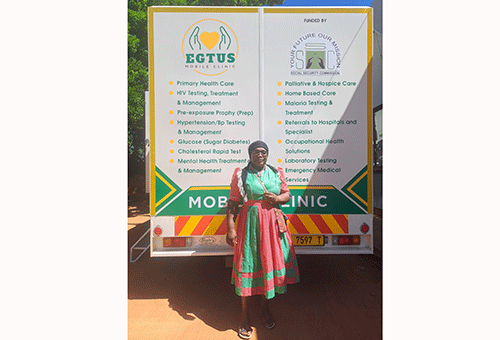Home-based healthcare facility evolves

Source: New Era Live
TSUMEB - Eglin Uises is one of the uncelebrated heroines of the Tsumeb community. With no prior medical experience, the mother of four founded the Hope Home Based HealthCare Community Clinic at her house in Nomtsoub in 2016 after her mother fell ill.
"I initially started the healthcare project with my brother, prompted by my mother's ill-health. My mother had three strokes, which left her needing assisted living. Being a regional manager by then and constantly travelling, I was forced to think how I was going to help myself with the condition that I was faced with," said Uises.
Uises (49), who was based in England in 2002, saw how people operated home-based healthcare services there.
"I shared this information with my brother and he agreed to support me with the idea of starting a home-based healthcare facility at our house. He said it was a great idea that needed to be put in motion," she said.
She then went to discuss the idea with her supervisor who also agreed that it was indeed a necessary thing to do.
"I was referred to Dundee Precious Metals Community Trust manager with whom I shared the idea of providing home-based care, integrated with palliative care, to any other person who needs it and he was immediately on board," Uises noted.
"Palliative care ensures that the person should not endure pain and as healthcare providers, it is important to control the pain so that the patient only suffers minimally," she stressed. The project consists of 15 employees including two registered nurses, three enrolled nurses and two volunteer doctors, with Uises serving as the executive director.
Home-based healthcare services involve improving the general condition of a patient.
"We need to improve their condition by adding an extra layer of support to the patient. Our target market is bedridden people, wheelchair bound, those who cannot bath or feed themselves, and those who wear adult diapers. This is a donor funded project, and all the commodities such as diapers, soaps, protective gloves and medical consumables are all donated to us," she added.
She said since the inception of the project eight years ago, it is dependent on donations. In 2021, the project added a feeding scheme, which was funded by First Capital. She explained that the healthcare providers would travel on foot to offer their services to patients, and realised that some patients had not eaten any meal.
"How do you give medication to someone who has not eaten since the day before?" Uises enquired.
She added, however, that the funds of the feeding scheme are running dry, as donations have recently stopped.
"We are operating on a N$6 000 budget, which is just not enough to provide two meals to the patients, hence we have resolved to offer only breakfast," said Uises.
She is grateful to Dundee Precious Metals Community Trust for their constant support since the project came into being. However, to keep the project running, it needed to be self-sustainable.
"We then came up with the idea of establishing a private clinic since it is better to grow in the same industry that we are used to, instead of having various things together. If we have a private clinic, the project will grow with a business linked to it, and that is how we established the Egtus Health Care Services clinic which was funded by the Social Security Commission of Namibia to the tune of N$2.5 million. From these funds, we purchased a mobile private clinic and renovated the house to set up the clinic," she said.
The Egtus HealthCare Services comprise a community clinic as well as a mobile clinic and even though the private clinic has an operational budget, it is not enough to sustain the project in the next three months. She, therefore, said they will use the mobile clinic to market their services to other towns such as Grootfontein, Omuthiya, Otavi and Tsintsabis.
"Our services are similar to other healthcare centres. We are simply complementing them. We would like the Tsumeb community to support our services because the income we generate from the private clinic is used to sustain over 100 patients that we have to take care of, for free since 2016."
The mobile clinic, which was received in November 2023, recently introduced prostate cancer testing at a fee. Other tests conducted at the mobile clinic include pap smear, cholesterol and diabetes.
It is registered and licensed with the health and finance ministries, the Namibian Association of Medical Aid Fund (Namaf) as well as the Health Professions Council of Namibia. The owner says all medical aid funds are accepted at the clinic, which operates from Monday to Friday.
